#white tailed ptarmigan
Explore tagged Tumblr posts
Text
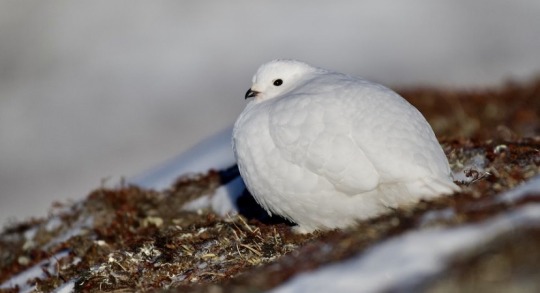
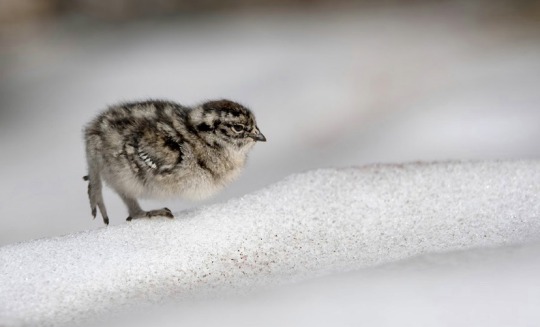
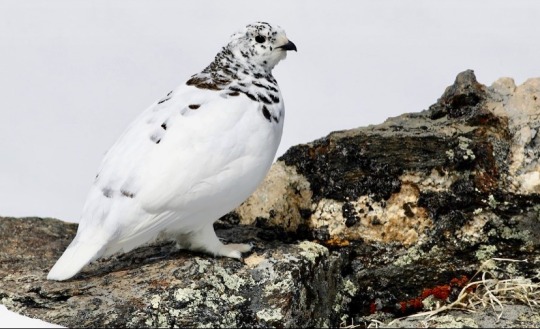

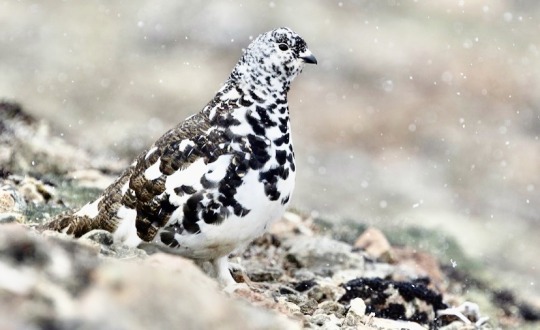

the white-tailed ptarmigan, also known as the snow quail, is a mountainous-dwelling bird and the smallest member of the grouse family. they are found at high altitudes in the continental united states, canada, and alaska. they have distinct ‘cryptic’ plumage, meaning that their plumage differs drastically throughout the year; during warm summers, they are speckled brown and black, going through an intermediary mottled phase before fully molting into their snow-white winter plumage. they primarily feed on insects and plant matter. their eggs are laid in a simple depression in the ground; the chicks are precocial and leave the nest soon after hatching.
#white tailed ptarmigan#snow quail#grouse#bird#birblr#Decembird#sorry for the lack of Decembird my house has covid :#))
4K notes
·
View notes
Text
BOTD: White-tailed Ptarmigan

Photo: Doug Greenberg
"Far above timberline in mountains of the west lives this elusive little ptarmigan, the smallest member of the grouse family in North America. While the other ptarmigan are strictly northern, this one follows the cordillera of the high Rockies as far south as New Mexico. Easily overlooked, it may crouch motionless as hikers pass close by."
- Audubon Field Guide
#birds#white tailed ptarmigan#birds of north america#north american birds#ptarmigans#grouse#landfowl#birds of the us#birds of canada#birding#birdblr#birblr#bird watching#bird of the day#Lagopus leucura
121 notes
·
View notes
Text
Semifinals, Poll 5
White-tailed Ptarmigan vs Sickle-winged Nightjar


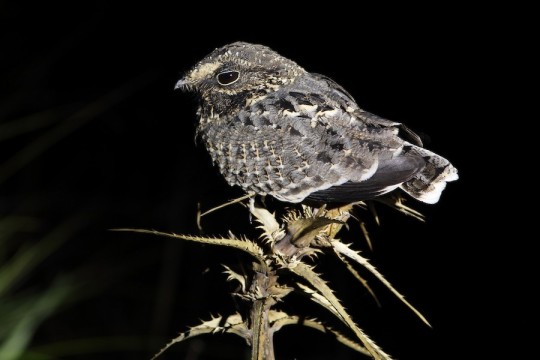
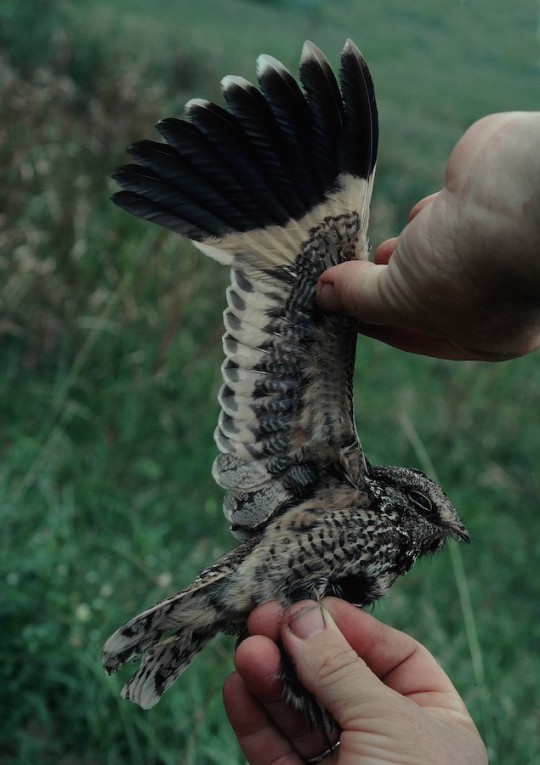
sources under the cut
White-tailed Ptarmigan (Lagopus leucura)
Lagopus is derived from Ancient Greek, meaning "hare foot". This is due to the heavily feathered legs and feet of ptarmigan.
eBird sightings: 5,809; IUCN Redlist Rating: Least Concern
Also known as the Snow Quail, this is the smallest bird in the grouse family. It serves as an indicator species for alpine tundra, and thankfully continues to fill a large range of western North America. The English name "ptarmigan" is Scottish Gaelic in origin, with 'tarmachan' meaning "croaker", referring to the bird's frog-like call. The p- was added due to a mistaken belief the word was Greek in origin, with the thinking being that the word related to 'pteron', "wing".
Sickle-winged Nightjar (Eleothreptus anomalus)
Eleothreptus, from Ancient Greek, means "marsh bred"
eBird sightings: 267; IUCN Redlist Rating: Vulnerable
There is not a lot of information on this bird, as nightjar are already cryptic and the common distribution of this bird hasn't been fully studied. They're currently found in northeastern Argentina, southern Paraguay, and southern Brazil. The Sickle-winged Nightjar shares its genus with a single other nightjar, which is also sparsely distributed across South America.
Images: Ptarmigan (summer - Garrett Hughes, winter - Josiah Verbrugge); Nightjar (wing - Kristof Zyskowski, body - Martjan Lammertink)
#aka: actually idk what thread is in common between these two. they're cute tho#hipster bird main bracket#white tailed ptarmigan#sickle winged nightjar#polls#caprimulgiformes#galliformes
36 notes
·
View notes
Text

White-tailed Ptarmigan
July 1, 2024
Nikon Coolpix P900
#bird#bird photography#photography#wildlife photography#photography blog#white-tailed ptarmigan#ptarmigan
21 notes
·
View notes
Text
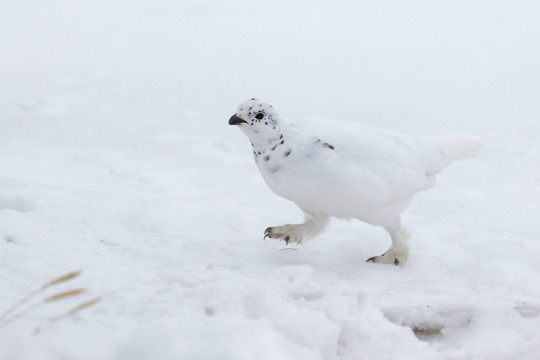
white-tailed ptarmigan (Lagopus leucura) by Greg Lavaty
229 notes
·
View notes
Text

Excerpt from this press release from the Center for Biological Diversity:
In response to a petition and litigation by the Center for Biological Diversity, the U.S. Fish and Wildlife Service today protected the Mt. Rainier white-tailed ptarmigan as a threatened species under the Endangered Species Act.
The agency also said it would reconsider protecting the bird’s critical habitat, providing hope that areas where ptarmigans live may be protected.
“These beautiful winter birds are immediately threatened by our warming world,” said Noah Greenwald, endangered species director at the Center and author of the petition to protect the ptarmigan. “Like a canary in a coal mine, the ptarmigan is telling us that we’re losing the snowpack that keeps Washington’s streams cool and flowing throughout the summer. It’s alarming and we have to protect these birds and the places they live.”
The ptarmigan lives year-round above the tree line in the Cascades from southern British Columbia to Mt. Adams in southwest Washington. In winter, they rely on dry, fluffy snow to bury themselves and stay warm. Climate change is resulting in more rain-on-snow events that create hard crusts unsuitable for the bird. In summer, ptarmigans prefer wet meadows created by melting snowfields and glaciers that are rapidly disappearing.
The tree line is also moving up and threatening to eliminate the bird’s meadows altogether. Ptarmigans are poorly adapted to warm temperatures, showing stress above just 70 degrees Fahrenheit.
The Center first petitioned for protection of the ptarmigan in 2010. It’s taken the Service 14 years to provide protection, when under the law it should have taken just two years.
“Our world is changing and changing fast,” said Greenwald. “The Service continues to move at a glacial pace to protect species like this highly imperiled bird. The agency desperately needs an overhaul to make sure we don’t lose so many vulnerable plants and animals.”
15 notes
·
View notes
Text
Rock ptarmigan (Lagopus muta)
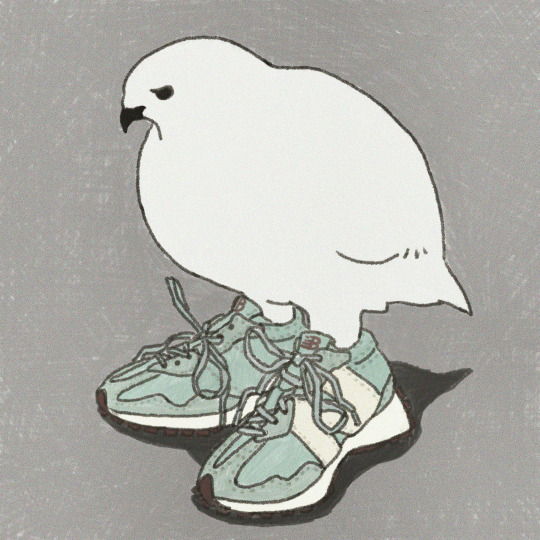
スニーカーライチョウ
Ptarmigan wearing sneakers
#NOTE: this drawing does lack the black eye mask of most rock ptarmigan species but OP specifically identifies it as one#Additionally; the white tail rules it out as a willow ptarmigan#ID#Drawn#Galliformes#Phasianidae#Ptarmigan#Rock ptarmigan#ID aside I adore this drawing. More birds in sneakers forever
11K notes
·
View notes
Note

White-tailed Ptarmigan, (Lagopus leucura)
Loveland Pass, Colorado, USA
What a lovely and elegant bird!
195 notes
·
View notes
Text

And a PARTRIDGE* in a PEAR TREEEEEEE!!!**
Mt. Rainier White-tailed Ptarmigan (Lagopus leucura rainierensis)
Cascade Mountains of Washington, USA and British Columbia, Canada
Status: Threatened
----
This ptarmigan subspecies was given protection in the USA this year. 🎉
*not technically a partridge **pear trees are not native to the Cascade mountains
#ptarmigan#bird#ground bird#bird art#birdlr#birb#usa#canada#washington#british columbia#endangered species#2024 endangered species#conservation#cascade mountains#north america
86 notes
·
View notes
Text

There's a white-tailed ptarmigan in here somewhere, I promise...
72 notes
·
View notes
Text



White-tailed Ptarmigan; Snowfield; Baby grouse [unidentified species]
North Cascades, Summer 2024
#north cascades#cascades#cascadia#pnwcore#pnw photography#pnw#washington state#washington#nature photography#nature#landscape#grouse#birds#pnw gothic
75 notes
·
View notes
Text
Birbvent - 15. Door, White-tailed Ptarmigan 🏔️

Another ultimate bird for the cold season awaits: It's the White-tailed Ptarmigan! In winter, they lead a sedentary lifestyle in order to conserve precious energy by avoiding flight (which, honestly same). However, they are so well adapted to the cold that warm weather stresses them out. When the temperature tops 70°F (21°C) they may bath in the snow just to cool off.

Source for the pictures ❄️ Open the previous door!
#Birbvent#bird#birds#let me know how I can make these better#and which bird is still missing#also who was your fave so far?
37 notes
·
View notes
Text
Round 2, Poll 21
White-tailed Ptarmigan vs Regent Honeyeater


sources under cut
White-tailed Ptarmigan
eBird Sightings - 5,592
IUCN Status - Least Concern
Location: North America - Alaska to Washington, with disjunct populations in the Rockies
“I like their plumage changes throughout seasons and their feathered feet”
Regent Honeyeater
eBird Sightings - 1,375
IUCN Status - Critically Endangered
Location: Australia - extremely patchy in Southeast Australia, in New South Wales and the very southern tip of Queensland
“they are critically endangered, they look like they’re edged with gold, and their eye/beak area looks like a bee to help them camouflage, I mean come ON”
Images: Honeyeater (Liam Murphy); Ptarmigan (Andrew Spencer)
Stats pulled from Birds of the World
#hipster bird main bracket#round 2#bracket: true b#white tailed ptarmigan#regent honeyeater#phasianidae#meliphagidae
25 notes
·
View notes
Text

White-Tailed Ptarmigan
July 1, 2024
Nikon Coolpix P900
#bird photography#photography#wildlife photography#photography blog#bird#white-tailed ptarmigan#ptarmigan
42 notes
·
View notes
Text
What's the Bird?
Location: Rocky Mountain National Park, Colorado
Date: Fall

We ask that discussion under questions be limited to how you came to your conclusion, not what your conclusion was.
Happy Birding!
Keep the game alive! Submit a bird HERE
Bird-439 graciously submitted by @nohriantomatoes
24 notes
·
View notes